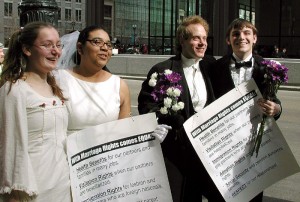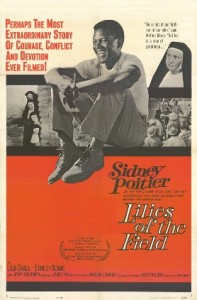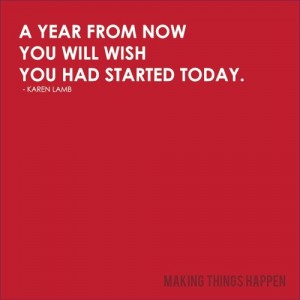My On-the-Fly Stance on Same-Sex Marriage
20 Jun 2013 8 Comments
in Bible, Justice, Politics, Theology
While sharing discussion on various online media about the recent news of Exodus International’s closure, I was asked to share my “stance on same-sex marriage.” I’m actually in the middle of a longer-form writing project focused on this; however, I figured that I might as well share the gist of my thoughts on the matter here in the mean time.
So, I’ve compiled my contributions to today’s discussion to respond still somewhat on-the-fly about my approach to the topic of same-sex marriage. This is partly observational with some forecasting as well as partly prescriptive with an explicit focus on conditions in America and an attempt to root my response in a close reading of scripture. Here are a few of the main points in the observation and forecasting category:
- Same-sex marriage will be legalized across America.
- Most Americans regardless of faith background tacitly accept a naive distinction between politics, sociology, and ethics that critically complicates how we make decisions about marriage since that state of affairs possesses a public, community-located, and private dimension to its existence.
- American Christians are ill-equipped to make good, assertive decisions about the rise of political, sociological, and ethical support for same-sex marriage in the broader culture due to the above taken together with the fact that American Christians possess a weak sexual ethic in general–this is true for both conservative / evangelical as well as progressive / liberal Christians as thoroughly evidenced by the statistical insignificance of faith background on sexual activity.
- In an attempt to prevent the acceptance of same-sex marriage in the broader culture, American evangelical Christians have made an ineffective decision to focus on the political and sociological arenas of activity rather than strengthen their sexual ethic and work outwards by way of influencing individual people. This is failing as everyone in the broader culture–including heterosexually oriented Christians–are adopting an ethic that is progressively less robustly informed by scripture.
- Even if American evangelical Christians succeeded against all odds to prevent the political acceptance of same-sex marriage, this would not affect people in a substantial way with regard to their behavior; both same-sex and opposite-sex attracted people will continue to behave in conflict with the sexual ethic that American evangelical Christians have espoused regardless of the political climate due to the entrenched, social acceptance of a sexual ethic based on things like freedom of personal choice, consent, and so forth with virtually no reference to scripture as a source of substantive, ethical information.
Here are some prescriptions based on the above. For the sake of being concise, I’ve included myself in the use of the term “evangelical Christians,” although I have some reservations about this phrase given its loaded connotations. When I’m not as concerned about being so concise, I often describe myself as a Jewish follower of Jesus with an orthodox, constructive framework. Right then:
- American Christians should abandon the attempt to prevent same-sex acceptance through political and sociological means, refocusing their efforts on developing a more robust sexual ethic that is actually compellingly for everyone regardless of what the political or sociological climate may be. Christians have done this in the past and can do it again; when we don’t do this, we functionally illustrate our lack of belief in the power of the gospel.
- American Christians should recognize the difference between marriage as a state of affairs created, defined, and protected by a given nation-state versus marriage as a state of affairs created, defined, and protected by the God of scripture; we already do this to a certain extent by expecting people who want to get married to both a) get a marriage license from the nation-state to effect a political union and b) partake in a wedding ceremony with the church as God’s agent for effecting a spiritual union.
- American evangelical Christians like myself should advocate for sexual activity limited to chastity in singleness or else heterosexual marriage from an ethical perspective regardless of the political or sociological climate.
- Evangelical Christians in representative democracies like me should advocate for what is in the best interest of the nation-state from a political perspective; based on all the data I’ve analyzed up to this point, this concretely means either a) advocating for the legalization of same-sex marriage, b) advocating for identical rights for civil unions that are equally open to same-sex couples as opposite-sex couples, c) advocating for the dissolution of all legally conferred benefits for anyone that the nation-state recognizes as being married while giving up those benefits in the mean time, e.g. through financial support to the same-sex community.
- American evangelical Christians like me should basically ignore a direct attempt to accomplish sociological change in the broader culture through any route other than the persuasive expansion of our own sexual ethic provided that we succeed in fixing it; of course, this will likely be a recursive process since people change over time and effectively communicating the gospel requires fresh articulation and demonstration with those changes.
- Evangelical Christians like me should deal squarely with the litany of hurt suffered by the same-sex attracted community specifically by Christians and take protracted, embracing, patient, humble, and courageous action to repair that damage indefinitely into the future with real people.
What is “Christian” Art?
13 Apr 2012 8 Comments
in Aesthetics, Guest Posts, Philosophy, Theology
Editors preface: For quite some time, I have wanted to showcase the work of erudite friends of mine for a wider audience than those who are typically exposed to their scholarship. Anticipating that I would have little time to devote to writing during the months of March and April due to a trip I had planned to Israel, I asked my friend, James Beal, whether he would be interested in sharing any of his work here. James graciously obliged, and I am happy to say that there is no one else’s thought for which I would rather use this website as a platform for broader discovery.
James is an attorney in Chicago with an expansive interest in a variety of subjects, including philosophical theology. He adapted the following essay from a dialog he conducted on the topic of aesthetics which I further edited for a more general audience. While James’s subject matter might seem a bit abstract on first blush, let’s be honest: A lot of ostensibly Christian art is really, really terrible. In fact, it is so egregiously poor that multiple different theologians have taken to analyzing why this could possibly be the case, from Scott Nehring’s medium-specific prognosis in “Why Are Christian Movies So Bad?” to Tony Woodlief’s more general yet scholarly “Bad Christian Art.” Nathan Kennedy’s blog went so far as to devote a two part series exploring the “suckage of Christian art,” and even the Gospel Coalition has taken to mounting discussions between various church leaders on the topic.
James’s essay intentionally leaves some questions unanswered, e.g. How are Christians supposed to promote good art, let alone nurture budding artists? Is there an assertive, one might even say missiological purpose behind Christian art as such? Are some contexts more and less appropriate venues for the production, distribution, or consumption of Christian art? Nevertheless, I believe his perspective advances the discussion instructively, and it is my privilege to recommend it for your reflection and edification.
I have listened to Bach’s cello suites. And I have listened to some of his overtly religious works, such as St. Matthew’s Passion. They are both beautiful. Are they both “Christian?”
It is difficult to describe religious experience compared to, say, religious exercise. An experience is inherently subjective while an exercise is objective. An exercise can be observed. It can be prescribed and followed. What happens in the mind or heart of the adherent during the course of the exercise is different from the exercise itself, and that happening is experience.
Art may not only be produced, it may be experienced. In fact, most art is meant to be experienced; it is meant to evoke thoughts and feelings of one sort or another. Can art be distinctly Christian in this evocative capacity? I believe it can.
Christian art is defined by a representation of at least two key elements: sacrifice and fealty. Thus, experiencing fealty and sacrifice in the context of something like an artistic element of Christian worship is different than experiencing the beauty of nature. Bach’s cello suites are like experiencing nature.
Don’t misunderstand me; I am not degrading natural beauty. I have been to the beach at night in coastal South Carolina and Florida. The combination of sensations—smelling the ocean breeze, seeing the stars glimmer, hearing the waves crash—is a powerful experience. One wonders if this is the sort of beauty that Adam and Eve encountered each moment before they were banished from the Garden of Eden.
But whatever our most distant ancestors experienced in antediluvian paradise, on the plains of Africa, or wherever, many of us know the Christian story, and we know it well. And that story is set apart from our daily life as animals on a physical planet. Human introspection, human ideas about how to organize and effect both our own lives and society, human thoughts about the physical nature of the universe and all that is in it—these concepts help define us as specifically human creatures. So, too, do vice and sensual experience, which are not always the same.
But, think about all of these things and then compare them to Christ’s words in Luke 9.23:
Then he said to them all, “If any want to become my followers, let them deny themselves and take up their cross daily and follow me.”
Where does that come from? That is totally different from a person’s typical experience with nature, with ideas, with another human, or with another human’s creation, such as art. What Christ articulated in this short passage is a glimpse of another layer of existence, an existence not dedicated solely to our physical and societal needs.
This is not to say that humans do not create things that remind us of, even engulf us in the fundamental basis of the good news of God’s salvation through Jesus Christ: sacrifice and fealty. We do create things that specifically attempt to evoke this response, that attempt to raise our awareness of fealty and sacrifice. And those are the sorts of created things that are “Christian.” Everything else is something different. That is not to say that everything else is bad—hardly. But it is different from a distinctly Christian creation.
There is another key element of the representation of the Christian ethos in art, and that is love, or charity when understood in the old way as an altruistic, concrete, sincere expression of compassion. Sacrifice, fealty, love–these three things define Christ’s existence. He sacrificed his life in fealty to God the Father and for the love of us. This is the Christian story. And art, which is accurately called “Christian” is defined by these three elements.
From this perspective, I would call Bleak House by Charles Dickens a Christian novel. Dickens’ representation of uncompromising love in the character of John Jarndyce vis-à-vis the love he shows his wards and even to rotten Mr. Skimpole is a fundamentally Christian portrayal of a character. In fact, Dickens is perhaps most “Christian” in his representation of prideful, dishonest, cruel, and folly-ridden villains. Dickens’ concept of evil embodied by these characters is fundamentally Christian because it purposefully represents the opposite of sacrifice, fealty and love. By doing so, Dickens’ villains reinforce the importance of those elements through impactful, negative counterexample.
In contrast, purely or simply beautiful art like Bach’s cello suites may be understood as “primitive” in the philosophical sense of the term. When Rousseau idolized infancy and simple-ness in works like Emile, or On Education, he expressly longed for the primitive. But if one accepts that humanity has left the Garden and tried to erect for ourselves some firm and steadfast structure reaching beyond the primitive with profoundly deleterious results—a process the Bible discusses in the story of the Tower of Babel—then the strictly simple, primitive nature of humanity is presently lost to us.
This fundamental fact of the loss of wholesale, social innocence or primitiveness is why we talk about “duty” and “sacrifice” and “striving for the greater good” even in secular contexts. What separates the secular version of these things from the Christian version is that they are tied to a man’s or a group’s imagined sense of right, virtue, or glory instead of being tied to those first relationships we found ourselves a part of from the beginning of time, like family or community. When we promote some sort of altruism or durable significance beyond whatever we would normally do by a sort of God-given default, we are acknowledging that we have moved beyond the primitive.
Eden and Babel are not the same. They are opposites. Eden is permanent even if its full recovery is lost to us right now; Babel is “happening” right now but frustratingly never finished. Put more philosophically, Babel is the idea of one person’s or one group’s action against another person or even against nature itself as a whole. Eden is the idea of “permanence” as true home, as perpetuity and peace and situated place.
So what does this have to do with art? Purely aesthetic experience—say, of a cello suite by Bach or a beautiful lyric poem—is not Babel. But neither is it the whole of Eden. It is more like a constituent element of Eden. Because of the distorting effect of sin, we do not experience the whole of Eden absent sacrifice, fealty and love. These are the keys that unlock for us a glimpse of the serenity from which we came and towards which God desires to ultimately locate us in eternity.
Returning to the illustration of English literature, these three elements converge powerfully and beautifully in Dickens’ Bleak House when Nemo, the law writer, interacts with the poor sweeper boy, Joe. Even though both characters have their problems, Nemo eventually dying of an opium overdose and Joe dying consumption, there are brief moments of distinctly Christian representation, e.g. when Nemo gives Joe a portion of his meager earnings with no strings attached or when Joe sincerely thanks Nemo for his kindness without any pretense or expectation but also without false humility.
A similar thing obtains in Charlotte Brontë’s magnum opus, Jane Eyre, through the juxtaposition of its eponymous protagonist with the character of her cousin, St. John Rivers. Both are ostensibly “Christian” figures, but it is Jane who achieves something closer to the unlocking of Eden while John remains counter-intuitively trapped in Babel. St. John expresses a single-minded obsession with working as a missionary; he implores Jane to marry him so as to be his helper, so as to partake in this all-important mission. But Jane refuses, desiring instead to experience her life in the company of those she loves and who love her. Late in the novel, she realizes a large inheritance and decides to divide it evenly between herself, St. John, and St. John’s two sisters—much to St. John’s chagrin. He would prefer that the whole of the inheritance be devoted to his missionary work. Jane persists in her course of action and eventually departs the company of her family for that of Mr. Rochester, a former suitor who has been struck blind since his last encounter with Jane. Despite his state of relative debilitation given the early 19th century setting of the narrative, Rochester is still deeply in love with Jane, who concludes that her true aspiration is to be nothing more than his wife in the countryside at Thornfield Manor.
Bronte’s representation of Jane is the that of a character whose central desire is for the “permanent” rather than something that is “happening” yet never finished, and her irrevocable divestment of financial resource to the benefit of her extended family coupled with her devotion to Mr. Rochester despite his functional decline in station fortifies this. Similarly, Nemo’s gift to Joe was a pure gift, given only for love and met by Joe’s sincere but not unduly humble thanks in Dicken’s Bleak House. These represent the story of Christ more compellingly than a thousand missions of Bronte’s St. John to the farthest flung corners of the world, let alone the construction of an indestructibly prosperous, healthy, secured state that Jane could have pursued had she kept the whole of her fortune and “married up” as far as possible instead of choosing Mr. Rochester.
These are “Christian” moments in Bleak House and Jane Eyre because they fundamentally represent sacrifice, fealty and love with a trajectory towards the permanent, with an eschewal of building some grandiose, unfinishable, always happening Babel. They represent the example of Christ, emphasizing Eden’s quiet to Babel’s clamor. As Jesus said to his disciples:
Original poster for Lilies of the Field (1963), a film adaption of William Edmund Barrett's novel by the same name for which the lead, Sidney Portier, won the Academy Award for Best Actor
And can any of you by worrying add a single hour to your span of life? And why do you worry about clothing? Consider the lilies of the field, how they grow; they neither toil nor spin, yet I tell you, even Solomon in all his glory was not clothed like one of these. But if God so clothes the grass of the field, which is alive today and tomorrow is thrown into the oven, will he not much more clothe you—you of little faith? Therefore do not worry, saying, “What will we eat?” or “What will we drink?” or “What will we wear?” For it is the Gentiles who strive for all these things; and indeed your heavenly Father knows that you need all these things. But strive first for the kingdom of God and his righteousness, and all these things will be given to you as well. (Matthew 6:25-33 NRSV)
Christian art is that which distinctly represents sacrifice, fealty, and love unlocking the permanence of our true home. Put another way, Christian art provides a representation in music, a literary character, and so forth of Christ.
Gain Command & Control Now – Building Wealth Tip No.1
18 Feb 2012 4 Comments
in 33rd Birthday Reflections, Building Wealth Tips, Pwn All The Things
Prologue: Since October of 2011, I have been posting a series of reflections on some of the most important lessons I learned the hard way over the past year. I published the first of these shortly after my birthday regarding the fine line separating the utterly depressing from the categorically awesome, arguing that we should relentlessly pursue the latter as if our lives depended on it (because they actually do). A few weeks later, I shared a second reflection addressing the common misconception that working hard is enough, asserting that we will only be substantially rewarded for bringing something of clearly discernible value to a given state of affairs and not for our efforts alone–a truth so obvious that we constantly miss it and suffer accordingly.
While considering which topic to address next, I received a bunch of requests for input on personal finance. I learned my most difficult lessons in this area a few years ago. Nevertheless, I’m interested in writing about stuff that is helpful to others whether or not it fits perfectly with my outstanding plans for blogging. So, I guess one can take all of the posts in this category of “Building Wealth Tips” to constitute a nice, multi-part lesson cross-listed in that category of those “33rd Birthday Reflections,” just in case anybody is keeping score.
Finally, I’ve noticed that a lot of people get spooked from substantial discussions about personal finance because so many of these discussions are 1) ridiculously focused on bean counting, 2) nowhere close to being comprehensively instructive, and 3) lacking hardcore, scientific support for the activities they so passionately promote. Instead, I’ll begin with a personal story and gradually work my way towards some nuts and bolts mechanics of the discipline, thoroughly citing the main things I want to share as food for thought. I figure that anybody reading this blog who wanted a bunch of arithmetically fixated information right out of the gate or a collection of disassociated financial pro-tips will have looked elsewhere already. There’s something else “in the way” for a lot of us when it comes to really gaining financial strength, and my goal with this post is to obliterate that obstacle as much as possible.
Also, I’ve never shared this story with anybody before. So, I hope it provides some insight for you.
~
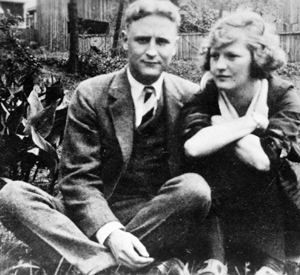
F. Scott Fitzgerald may have been one of the most impactful American authors of the 20th century, but his weak command of personal finance still ruined his life.
I packed my last suitcase and slung two ill-fitting blazers over my left shoulder. The pine trees framing my dormitory window fragmented beams of late-afternoon sunlight, dribbling their golden rays across my face in piecemeal obscurity as the day’s events disturbed my hopes for what lay ahead. I was partway through a graduate course of study at Princeton Theological Seminary with a vaguely defined career goal, a sharply reinforced cost, and a path almost perfectly opposed to Fitzgerald’s Amory. I knew that God was still alive and kicking in my heart, that wars worth fighting abounded, and that there was some good in humanity still. But I was just moments away from the abrupt realization that I did not know myself as surely as I thought. And I was completely embarrassed to learn this lesson through what seemed like the most base catalyst possible: Money.
I had just signed a promissory note for another several thousand dollars of student loans, a process required by my school every year seminarians wanted to avail themselves of such an opportunity to offset the cost of their education. And despite the fact that I had concluded that such a thing was “good debt,” I had never come close to possessing a tenth of what I now owed. Plus, I still had another year and another round of loans to go. Having grown up just above the poverty line, nobody from whom I had received financial counsel in the past could speak compellingly to my situation. I had been taught to avoid all debt like the plague, but I recognized that the net effect of achieving a more substantial education earlier in my life, likely leading to a higher level of compensation for my labor, was the more mathematically sound way to go. Moreover, none of the people who had so thoroughly impressed upon me the importance of avoiding all debt were particularly wealthy, which either meant that it was impossible to grow legitimately wealthy in one’s lifetime that way (a demonstrable falsity) or that there was something fiscally wrong with their perspective.
In short, math and logic were picking a fight with my upbringing. And while I knew that logic and math told no lies, I hadn’t risked anything this gutturally important on them since that one time I won a bet about calculating the velocity at which a drunken friend would strike a submerged refrigerator after leaping from a bridge suspended a certain height above a river–thanks to integral calculus. Delaying my education until I could afford to pay for it out of pocket with money squirreled away from whatever job I worked in the meantime deferred an increase in my earning potential, an increase great enough to easily outstrip the cost of financing the aforementioned loan. But more importantly, such a delay prevented me from pursuing the sort of work I wanted sooner by definition, which also postponed all sorts of life-events, relationships, and complimentary endeavors connected to that work. This made my student loan a type of investment in myself enabling a swifter, more impactful benefit for the people and projects what would be positively impacted by my own growth. And since this was a federally subsidized loan under consideration, there were all sorts of advantages and protections woven into the system amplifying the smartness of incurring that debt despite the inherent risk that even the most worthwhile investments carry.
Simple call, right? Wrong–I panicked.
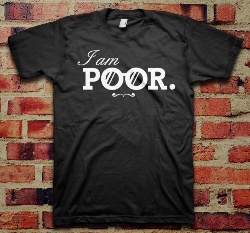
In grad school, I was too poor to justify buying this shirt that retails at $25 from playwho.com. Oh, the irony...
I looked for every feasible way I could whittle down my expenses to as close to nothing as possible. I ate fewer meals and guiltily sneaked cereal out of my dining hall for breakfast the following morning. I bought no clothes, which made me horribly dependent on the good graces albeit risky stylistic conjunction of holiday presents. I spent hours researching the most inexpensive versions of the class texts I was forced to buy when repeatedly checking them out at the library would not suffice. I rued the fact that I could not afford to take a lady I fancied on anything but an utterly cheap date–all the while not picking her up in the car I did not posses because I was too freaking penurious to purchase a decent vehicle, let alone maintain one. And while thrifting and cycling were all the rage among the graduate student set in my hometown of Chicago, this approach was not generally well received or advised at Princeton.
Deep inside, I sensed that all my efforts at frugality were insignificant. I was sure that I needed to substantially cut a major cost. And dormitory housing coupled with a mandatory meal plan was my single, largest expense category. So, I made a painful decision to mitigate that by taking a job as a resident manager of an institutionally affiliated conference center off the seminary quad, enabling me to effectively zero-sum rent, food, and part-time pay. While that probably sounds like a brilliant idea, I said “painful” because the life of an aspiring theologian at Princeton was frequently, deeply lonely for reasons I’ll probably get around to describing some other time. Healthy, robust community was rare and difficult to cultivate even living on campus, let alone removed from it, and it was not just something I craved but something I wanted to be able to give to others at the core of who I was.
Cultivating robust, healthy community where people could grow and support one another to their mutual benefit was a central, guiding principle of the life I wanted to live. Being able to engage in this project more effectively on the far side of seminary was one of the main reasons I chose to pursue that course of training in the first place. Thus, my aforementioned financial “solution” functioned as a shift of expense from finance to purpose and ethics. In fact, it risked a net loss of “wealth” defined not just as one’s fiscal wherewithal but also the strength of one’s key relationships, long term prospects, freedom, security, and so forth. My solution threatened a conflict with who I wanted to be, what I wanted to do, and what I knew that both my colleagues I needed at that stage of our lives. But there was no way to ascertain whether the benefits of this shift would be worth the cost apart from giving it a shot and finding out. And since the whole idea of a seminary education boiled down to an investment in me, my own lack of confidence in myself effected a recursive loop of irritatingly pitiful consternation.

A shot of me with my dad around the time of the events described by this post outside the main classroom building at Princeton
I planned a final departure from my dormitory when most other students were taking their evening meal to avoid encountering anyone who might probe the turmoil I feared I could not keep from surfacing. I strode briskly through the autumnal dusk across the deserted quad. And while I was somewhat tired from previous trips carting boxed-up belongings to and fro, I felt something other than mere fatigue silently approach me from the darkening woods lining my path. If you’ve ever blacked out from standing up too fast, felt your stomach drop whilst peering over a momentous ledge, or sensed a tingle run through your limbs before executing an exciting but also terrifying feat, you know about the sensation. You’ve felt everything around you slow down. You’ve become hyper-aware of your own processing of whatever’s confronting you, and your mind has raced with abnormal clarity to exhaust all available options towards some eureka-like conclusion by brute-force if necessary.
And that’s when something within me finally broke.
I felt dazed and moved to tears and short of breath and stymied and somehow also somewhere else from everywhere I had ever been before. I muffled myself as much as possible until I could duck behind the closed doors of my destination and began to sob uncontrollably. I felt caged and exposed all at once. I caught a glimpse of myself in the mirror, looked vaguely unrecognizable, and began to wonder whether professional counseling or psychopharmacological intervention were in order. I was sick of carrying the tension of trying to figure out something that should have (obviously) been so easy to resolve as a few thousand dollars owed by a young, able-bodied, single man with half a brain in his head. And that tension had finally shattered something I carried deep inside me.
I not only believed in a God commanding the floodgates of heaven but had so frequently witnessed this God provide for people in completely mundane and thoroughly surprising ways by turns that I had chosen to devote my life to guiding others to worship and be liberated and renewed and flourished through a loving relationship with that God. I had traveled the world, helped save people’s lives, witnessed vistas of penetrating beauty, loved, lost, and lived more at twenty-something than many do by the time they depart this mortal coil. I was supposed to be made of stronger stuff than this. But no matter what I knew, said, or did, I could not escape the fact that around twenty-something-thousand dollars of debt was all it took for me to completely flip out.
How embarrassingly weak and conflicted and immature it seemed I truly was.
~
Over the subsequent years, I also learned to give myself a break rather than merely suffer from one. I gradually realized that I had encountered something back then that has only lately occurred for a lot of people, and this is the interior experience of the catastrophe of a financial worldview of insidious nature, a background subroutine of total maleficence propagated as conventional wisdom. Despite achieving an undergraduate degree with highest honors in four different, bankable foci, despite gaining admission to the most selective seminary in America, I had never taken a single, comprehensive course in personal finance–nor was I required to do so at any stage of my formal education. The closest I came to something like that was a merit badge I earned along the path to become an Eagle Scout as a teenager–thank God for the BSA at least. But I had never encountered anything strong enough to course-correct for this pervasive coadunation of fiscal claptrap coupled with a progressively greater dependence on a resulting web of economic misbelief ensnaring the vast majority of people I know today.
I was a smart, hard worker in general, but that no more guarantees financial health than being born rich–a lack of soundly applied fiscal principle can easily decimate both and, in fact, does just that with cold regularity every single day. Most unfortunately, my abysmal level of financial literacy at that time is the norm for America. Unless you are one of the lucky few, you probably received a terrible financial upbringing, too. It doesn’t matter if your parents were responsible, generous, and involved with your life (like mine) or if you had to figure everything out completely on your own, either. To depart from personal narrative for the sake of statistically broader applicability, consider that:
- Just 25% of American adults claim that they are satisfied with their “personal financial condition.” Moreover, we are used to living this way; we are comfortable with being for the most part oblivious about how to improve our financial condition even though we don’t like where we are.
- About 66% of American high school students participating in a country-wide survey by The National Council on Economic Education flunked a basic economic literacy test, with 49% of adults surveyed failing similarly.
- Lacking the ability to work our way towards managing greater wealth, we try to live as if we already possessed all the benefits of this process through credit. Total American consumer debt topped the $2.43 trillion mark in May 2011, i.e. roughly 16% of our gross domestic product. This correlates with the 2010 figures for the United States’ public debt-to-GDP ratio of 102% compared to healthier economies like Germany’s at 78.8% or Norway’s at 48.9% or New Zealand’s at 30.3%. Translation: We are taking on progressively greater levels of private debt, and we are becoming statistically less likely to pay back the debt our government is incurring. Our inability to find a solution for the latter issue is precisely why Standard & Poor downgraded the United States’s credit rating for the first time in history in August 2011.
- Moreover, Americans now hold roughly $772 billion in credit card debt alone, and we typically underestimate our credit card debt by around 33% of the actual figure that we owe. That’s how accustomed we have become to poor financial principle coupled with living on credit.
- Despite the above, children’s spending has roughly doubled every ten years for the past three decades, and it tripled in the 1990’s. Paired with this trend, more than 1 in 5 youth ages 12 to 19 have their own credit cards or have access to their parents’ according to The Jumpstart Coalition’s research on the matter. Since we are becoming less fiscally adroit with every generation, this means that we are literally setting up our children for personal financial disaster, bit by bit and day by day with every ounce of negligence and penny hocked on credit.
- And out of control credit card abuse is just one indicator of the problem. In the month of December 2011 alone, total consumer credit grew by $19.31 billion, more than twice the $7.7 billion increase expected by Reuters analysts to yield the single largest jump in ten years for non-revolving credit, which covers categories of debt like auto and student loans.
- Despite the fact that almost all of us know we’re supposed to cultivate sound habits of saving, our actual rate of savings has steadily declined for over thirty years regardless of the state of the overall economy–that is the power of a weak command of building and managing wealth. In fact, our aggregate rate of savings recently dropped all the way to 0%–as a group, Americans saved nothing whatsoever–from a high of nearly 12% of our income in previous generations.
- Roughly 60% of Americans don’t even know much they need to save for retirement according to a national survey on Financial Capability in the United States for 2009. Even if all of us leaped back on the wagon of prudent practices of saving, we wouldn’t even know how much to save to cover our basic necessities in our old age.
- A large quantity of Americans do not substantially invest as part of a strategy to build wealth, and only 5% of those who do invest feel that they “know everything” they need in order to make good financial decisions.
- Ironically, our common sense beliefs about what constitutes “safe” and “risky” places to store or invest money arguably run exactly the opposite of what is actually the case. We think that saving a bunch of currency is the safest way to go in the long run, but inflation annihilates this. In contrast, we think that stocks are extremely risk despite the fact that the market overall has grown by 10% on average each year even in the case of a down economy while the average rate of inflation–i.e. a measure of the effective decrease in purchasing power for hard currency–has run about 3.43% over the past 100 years. To put this in perspective, it now takes $700 to purchase what $100 would have bought in 1965; in contrast, $100 properly invested in the S&P 500 index starting in 1965 would have grown in value to $6072 today–that’s a loss of more than 85% for currency and a gain of over 6000% for stocks.
If we live in a material world, why on earth are we so terrible at managing our finances? The experts are divided on this one, even when we limit the question to savings, but one thing is for certain: This is a terrible excuse for a way to live. Most of us are not totally disinterested in money or how it works–even those of us aspiring to an ascetic or a bohemian ideal still use money. But many of us have been trained to regard the ability to build wealth as being ancillary if not distracting or overtly poisonous to a life well lived. Everybody knows that people who focus their attention on money inevitably become consumed by it, right? Think about how many books or movies or plays or songs you’ve encountered with precisely that script.
The problem is not that we are unduly sheltered from pointed teaching about money. To return to my own story for a moment, I shared more conversations with respected teachers about personal finance than I could remember before my involuntary, gut wrenching paradigm shift as a grad student. I had read multiple articles and books recommended to me from trustworthy sources, and I figured myself for a pretty responsible, capable guy. I had already learned that managing money effectively was important–not just for my personal level of comfort but because of the broader, ethical implications for those impacted by my level of financial strength. This is probably one reason why pastors like Greg Laurie emphasize that there are over twice as many Bible verses on the topic of finances as there are for topics like “prayer” and “faith” combined. Financial aptitude is spiritually important; there is something related to universal justice and personal priorities when it comes to what each of us do with our money. In fact, there are roughly 800 passages of scripture dealing with money alone, and about half of Jesus’s parables utilize money as a teaching illustration. But here’s the problem with all this.
A bunch of conversations, articles, books, and Bible verses that are not comprehensively organized by a sound command of the basic principles of financial health for our time and place don’t amount to a pile of beans. In fact, they can inoculate us against the realization that we still don’t have a clue about what to actually do when it comes to effectively building and managing wealth. Too many of us act like a bunch of weekend warriors who know every possible basketball or baseball statistic, who religiously watch our favorite teams on television week after week, and who study the history of our sports with dutiful attention but never actually get off the couch and learn how to play the game in real life.

There was better info in the Boy Scout's "personal management" merit badge process regarding financial health than my entire, formal education
The way most of us are taught about wealth lacks this basic command of the discipline of personal finance. Instead, we get a bunch of fragmented pieces of data flung at us while lacking an effective, discriminating toolkit to process that data usefully, e.g. Get good credit (somehow)! Buy a house! Invest in gold! No wait, don’t buy a house! Save your money by getting a credit card with rewards points! No wait, credit cards are the devil! Want to grow rich ethically but you’re born poor? Your odds are about as good as playing the lottery–oh well! Invest in a Roth IRA with actively managed mutual funds contributing to a diversified portfolio! No wait, dump everything into bonds in a volatile economy! No wait, screw all that, work 80 hours a week, and save like crazy! Go to the best, private college in which you can gain admittance–everybody pays off student loans for thirty years! No wait, neither Bill Gates nor Mark Zuckerberg finished college; so, stay away from higher education if you really want to be rich! Oh yeah, and remember to give to charity every once in a while! And so forth…
So here are the two big ideas of this post:
- Knowing how to properly build and manage wealth is an absolute necessity for a life well lived, and we need to gain command and control now. Even if you wind up eschewing the acquisition of capital assets (like property), current assets (like cash), or investments (like stocks) for some reason, you must know what you’re getting in exchange for this trade-off and it must be worth it for the way of life you’ve chosen. Explicitly chosen or de facto ignorance of personal finance is just perpetuated foolishness layered atop a festering pile of crappy social convention that is destroying people’s lives, wreaking havoc on our families, and damaging society. As a comparison, I can chose to neglect studying literature comprehension and composition, chose to disregard developing a facility for philosophical though, and chose to pass on gaining those social graces commonly called “people skills” or “emotional intelligence.” But all of these turn out to be incredibly, demonstrably valuable for my time and place–not just for me but for the people with whom I associate, those who depend on me on a day to day basis, my friends, my work associates, my family, my community at large, and my world. So, I had better know that whatever I’m getting in exchange for not burning the time and energy it takes to acquire those skills is really worth it. The same thing applies to knowing how to properly build and manage wealth.
- Everybody can learn how to properly build and manage wealth better, and it is far easier to do than most people think. Why? Because it is so completely counter-cultural that hardly anybody has tried to do so who is not already one of those lucky ones raised with a comprehensive, working knowledge of personal finance. Notice that I am not saying that it is easy to become phenomenally wealthy; I am just saying that it is an achievable and worthwhile goal to gain the skills necessary to build and manage wealth better. You may be terrible at mathematics; that doesn’t matter. You may be a 100% type-B creative, artsy individual; you can and should still learn how to properly manage and build wealth more soundly–in fact, your livelihood and creative output as an artsy individual depends on it. You may conclude that you’re pretty bad at some part of the process of managing your finances; you must know why and to whom you can safely delegate that part of your overall responsibility. You may have been dealt an incredibly tough, impoverished hand in life; you should and can learn how to properly build and manage wealth still. As professors Thomas Stanley and William Danko found in their research leading to the text, The Millionaire Next Door, roughly 80% of American millionaires are “first generation affluent,” meaning that they built and managed their wealth in an utterly mundane and often broadly achievable ways, i.e. from the ground up rather than simply inheriting it in one shot of ultra-fortuitous, windfall privilege.
The way I began this post might suggest that I regret my time as a graduate student at Princeton, that I still feel embarrassed over how irrationally I responded to the simple act of taking out a student loan and moving away from my dormitory for a spell. But nothing could be further from the truth. When I look back on the day the haphazard edifice of my sorry excuse for economic competence crumbled to oblivion amidst my confused blubbering, I thank God that the lesson came across so intensely because it finally motivated me to change–no matter what.
Most of us never get this chance. Most of us become so so deeply committed to financially insolvent patterns of life that it is too late to substantially alter our situation for the better once our eyes are finally opened to the ramifications of our ignorance as we grow old and progressively less able to fly by the seat of our threadbare pants. We are vaguely uncomfortable for years on end but never so pointedly so that we do anything to really rethink and rebuild this broken way of life. But it doesn’t have to be that way.
When it comes to your financial health, depart from the herd now. Gain command and control now–not tomorrow, not someday when you’ve “grown up,” not in a couple years when you have a better job or more time to think about this stuff. Gain control and command of your own ability to better manage and build wealth starting today and every day afterwards. Dentists are fond of saying that we only need to brush the teeth we want to keep. Something that basic is true of personal finance. The cost of denial inevitably extracts its revenge, and the benefits are manifold and life enriching. So take action and be courageous.
Now.
In subsequent posts in this series, I’ll try to address some of the keys to bridging that gap from the status quo of poor fiscal practice to a future of financial health. But if you’re already feeling pretty motivated to get the ball rolling, here are some decent ways to do so:
- First, get your head in the game–apply as much diligence to gaining command and control of your ability to build and manage wealth as you would to any other important, life-impacting skill. Take everybody’s word with a grain of salt, and leverage your own learning style. If you don’t handle large blocks of new information well, then break the following down into tiny bits that you purposefully and systematically process day by day. If you hate reading, find solid resources you can listen to or watch online or talk about with others who are similarly inclined. Keep checking out the stuff below, and keep on rocking in the free world.
- In the event that the basics like budgeting or getting out of unhealthy debt are challenging for you, consider a text like Dave Ramsey’s The Total Money Makeover to present some options. If you need more help than a book, find a Financial Peace University class in your area. If you live in Chicago, you can even participate in one that some folks from my own church are going to host in April. Just email me for details, and I’ll be happy to help get you connected. If you don’t like Dave Ramsey’s approach, there are plenty of other options out there, like the Good $ense curriculum developed by the Willow Creek Association, as well as several others.
- If you’ve passed beyond dire straits and are ready to really build some wealth, a couple good volumes on this subject are the aforementioned The Millionaire Next Door and one of my personal favorites, The Millionaire Teacher, by Andrew Hallam–a regular guy who built a multi-million dollar portfolio before he turned 40 on a teacher’s salary. Again, there is no such thing as an “always applies in all circumstances,” no-brainer way to go when it comes to building wealth, but those two books present good food for thought if you want to begin to develop a lay of the land regardless of your present level of employment.
- Concerned about the ethical questions involved because of your religious upbringing (or lack thereof)? Check out Randy Alcorn’s Money, Possessions, and Eternity for an extensive essay attempting to address these topics from a biblically informed perspective. I’ve also heard good things about Craig Blomberg’s Neither Poverty nor Riches: A Biblical Theology of Possessions, but I have yet to read it and cannot personally vouch for it on that basis.
- Just want a couple good article online with immediate pay-off? Read this short post and you’ll know more about the difference between assets, liabilites, and equity than the vast majority of Americans today. Read this article from Generation X finance for the most basic, one-shot explanation of how to build wealth that I’ve encountered so far. If you’re totally up a creek without a paddle, Dave Ramsey’s Seven Baby Steps to Financial Peace summarize a substantial portion of the core teachings of his aforementioned book and class curriculum.
- Hate reading a lot of stuff but still want to learn? Try the Khan Academy’s selection on core finance and, for the high fliers out there, valuations and investing. There are a ton of open courses on these and similar topics from institutions like Berkeley and MIT, but if you’re not sufficiently motivated to Google search them, then you probably won’t click through any links I provide, either. (Okay, here’s an article with a nice, top 10 list.) Another way to go would be to check out a few of the Internet forums that have developed to promote discussion on personal finance. My favorite at the moment in this regard is /r/personalfinance, but your mileage may vary.
The American author and speaker, Jim Rohn, once said, “We must all suffer from one of two pains: the pain of discipline or the pain of regret. The difference is discipline weighs ounces while regret weighs tons.” In conclusion, I hope and pray that you’ll embrace the discomfort it takes to gain command and control of your ability to effectively build and manage wealth right now for your sake, for those whom you love, and for the truer dream you can live that beats the tar out of the American lie too many of us have swallowed–hook, line, and sinker. The best is yet to come…
Note: I have dedicated this post to a few of the people who helped me move towards a more mature understanding of personal financial competence than just about anybody else of late. So, here’s a big thank you to my uncle, Bruce Heverly, to my friend, Dan “realtor for life” Spransy, and to the good people of /r/personalfinance and its associated subreddit community. May God bless you to be a blessing in the days ahead more than ever before.
Valentines Day Was For Martyrs, So Kick Butt For Love
14 Feb 2012 2 Comments
in Christian praxis, Compassion, Justice

You can thank Geoffrey Chaucer for first bringing a romantic dimension to Valentines Day--about a thousand years after the fact.
This is not an anti-Valentines Day post. Yes, the holiday has been ridiculously commercialized. Yes, it can be a total downer if you are single. Yes, it can exert a ton of pressure if you are not single and you feel you need to come up with some grand scheme to communicate your affections or else completely disappoint the person you’re with. Yes, our current observance of the holiday bears little resemblance to Victorian Era bliss when people quoted Chaucer at whim and wrote their own cards with beautiful penmanship, when men were truly men and women were truly women and everybody knew how to dance and court and woo like Pride and Prejudice.
But here’s the thing: Valentines Day was originally a commemoration for martyrs, people butchered for their unyielding commitment to sharing God’s love no matter what. So can we all agree to shuffle our various decks of expectation and get out there to kick some butt for love’s sake? Feel free to consult your favorite encyclopedia or History.com or something if you doubt me, but the celebration of Valentines Day is ancient–as in practiced informally nearly two thousand years ago and formally established somewhere around 496 CE ancient. Its purpose was to memorialize several different people with “Valentine” or “Valentinus” somewhere in their names who were all slaughtered for their active, counter-cultural faith in Jesus by a powerful Roman Empire. For example, one of the dudes whose death the holiday recalled, Valentine of Terni, served as the bishop of Terni, Italy until his death around 197 CE. His reputation as an evangelist, miracle worker, and healer was so great that he was not only imprisoned, tortured, and beheaded to halt his ministry during the persecution ordered by Marcus Aurelius, he was executed at night in secret so that the people of Terni would not break out into riots to avenge him because of their adoration for the guy.
When a pagan government has to kill you in secret because they’re scared of their own pagan citizenry flipping out, you are doing it right. And that is why Valentines Day should ultimately be a call to arms, a call to compassionately and assertively embrace others–risking blood and thunder if necessary, with quiet and sustained and painstakingly humble means if that is what gets the job done best, with a heart so committed to responding to God’s overwhelming love for us that it can no sooner be dissuaded from inhabiting and sharing that love than it can stop beating and survive.
Some Christian holidays were derived from preexisting celebrations of other cultures, such as the explicit attempt by the Roman Catholic Church to co-opt and borrow elements from Dies Natalis Solis Invicti through its formalized celebration of Christmas. And while there were multiple different festivals from multiple different people groups around the same season as our contemporary celebration of Valentines Day in its formative context of Late Antiquity, there was virtually no carryover whatsoever into the original celebration of Valentines Day. Moreover, there was no romantic overtone to the holiday at all until Geoffrey Chaucer took a whack at it around a thousand years after it had been formally established. All the “love” celebrated in Valentines Day for the first millennium or so of its existence referred to the selfless compassion of people who literally laid down their lives to share the love of God with others.
This is not to say that romance has absolutely no place in the “proper” observance of Valentines Day or that other forms of love, like friendship or affection, are patently base. What’s at stake here is a matter of perspective and priority. In The Weight of Glory, the Christian essayist and former Oxford don, C.S. Lewis, launches into a diatribe against the popular notion that proper faith in God should merely blunt our passions:
“If we consider the unblushing promises of reward and the staggering nature of the rewards promised in the Gospels, it would seem that Our Lord finds our desires, not too strong, but too weak. We are half-hearted creatures fooling about with drink and sex and ambition when infinite joy is offered us, like an ignorant child who wants to go on making mud pies in a slum because he cannot imagine what is meant by the offer of a holiday at the sea. We are far too easily pleased.”
No matter what your station, you have the opportunity to live the dream this Valentines Day of tasting and passing along a dose of the infinite joy that God’s very self has offered us. Don’t hate on all the lovebirds. Don’t turtle up in your shell of forever alone-ness. Don’t get so absorbed in your significant other or latest crush or going-on-thirty-years-of-marriage-spouse-of-consummate-awesomeness that you miss the deeper and even more awesome opportunity to get out there and kick butt for love in the way that those long-dead martyrs once knew. And just in case you’re totally devoid of ideas about how to do that, here are a few that I came up with for your consideration:
- “Like” on facebook as well as donate to The Chicago Alliance Against Sexual Exploitation, which is building a global community free from all forms of sexual exploitation, including sexual assault and the commercial sex trade.
- If your grandmother is still alive, call her. Just do it.
- Remember that whole martyrdom thing? Visit Voice of the Martyrs homepage to learn about the millions of people suffering intense persecution for their faith in Jesus right now and donate to support their ministry.
- I read an email from a good buddy of mine who’s a dude fifteen minutes after midnight of February 14 that concluded with an all-caps “HAPPY VALENTINES DAY!!!” This inspired me to duplicate the matter for all the messages I will send today. Hey, why not join us and take things up a notch by linking the salutation to this article to inspire others, like this:
Dear Herp,
Just wanted to check on those TPS reports. How’s it coming?
- Buy a dozen flowers and distribute them to the oldest, most homely, or most needy people you encounter, looking them right in the eye as you wish them a Happy Valentines Day. By the way, just because some random person gives you a flower today does not mean that you are ugly :D
- Scope out this article listing fourteen different charitable options for Valentines Day compiled by the Case Foundation, spanning everything from fair-trade cards to ways of volunteering to methods for expressing compassion for those who could really use some, like nursing home residents.
- Still need some ideas about how to celebrate the holiday with that special someone or total lack thereof? Check out this article by USA Weekend listing twenty-three ways to do so whether you’re spoken for, single, chilling with kids, hanging out with friends, or all by yourself. But, seriously, don’t spend today all by yourself; there are plenty of people who would enjoy your company.
- Remember God’s love for you and take advantage of the precious opportunity you have to share that love with others. If you just need to hear it, this reading of 1 John by the award-winning Max McLean is a pretty good option.
Note: This post is dedicated to four women who have recently, unexpectedly, and graciously brought a dose of joy into my life. To Kay Spreitzer for definitively introducing me to the swing dancing community at Fizz, to Rachel Durchslag for teaching me about the amazing work of CAASE, to Katie Fretland for her dedication to The Howard Brown Health Center with well wishes for her new journalism gig in Oklahoma City, and to my sister and favorite valentine, Adriel Harris, for sharing the masters and demos for her forthcoming musical releases to which I wrote this piece. (Holy Moses, get ready, world…)
Shop Talk: Facebook Page Syndication a “Go”
27 Jan 2012 Leave a Comment
in Pwn All The Things, Shop Talk
I don’t spend much time writing specifically about the act of blogging, but I realize that a lot of folks have found their way to what I’m writing lately because they have tracked me down from my reddit username, because they are even more into blogging than me, or because they’ve clicked through links shared on facebook. While redditors undoubtedly need no primer whatsoever on pwn’ing teh Interwebs (cutting out that cat facts craziness–now that’s another story), I figure those of you committed to facebook or interested in so distributing your blogs might enjoy some shop talk about syndication.
I started a public facebook page a few months ago based on the hunch that there was probably a class of people out there who wanted to “like” a page in order to follow its updates rather than “friend” or subscribe to another facebook user. Sure enough, around 15% of the people who are currently pulling updates from my page right now fall into that very category. To utilize this fact whilst preparing for the inevitable flood of friend requests that will overwhelm my personal profile after I share my research on cold fusion, the cure for cancer, and how to put the toothpaste back in the tube, I decided to syndicate my blog posts straight to my twitter feed and facebook page.
There are a lot of ways to do this, but my favorite one at present utilizes Networked Blogs’ protocol. It’s pretty easy to set up if you want to check it out for your blog. And if you’re a facebooker looking for an even easier way to get to my posts without leaving your comfortable womb of social networking, just click that neat-o little “Blog” icon like so:
This will magically bring you to this part of the page where you can see all the syndicated posts, like so:
And as the French gnome I met at the Starbucks near Chicago and Franklin would put it, c’est tout ce qu’il ya à faire!
Many thanks to Chris Bruno of The Restoration Project and Rose Gardner of Daskea.net for hipping me to this method, and many thanks to Paper Diamond for supplying the soundtrack to the composition of this post through their erstwhile soundcloud account. I gotta a show to catch by my buds of Milwaukee’s I’m Not a Pilot; so, until next time, Shabbat shalom!
